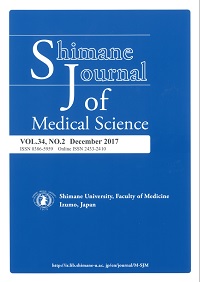Shimane University Faculty of Medicine
ISSN :0386-5959(冊子体)
ISSN :2433-2410(オンライン)


これらの論文は クリエイティブ・コモンズ 表示 - 非営利 - 改変禁止 4.0 国際 ライセンスの下に提供されています。
ダウンロード数 : ? 件
この文献の参照には次のURLをご利用ください : https://ir.lib.shimane-u.ac.jp/55200
Shimane Journal of Medical Science 41 1
2024-03 発行
The Signal Transduction of Abnormal Vascular Smooth Muscle Contraction
内容記述(抄録等)
There are two types of vascular smooth muscle contraction. One is normal contraction, which is physiological and Ca2+-dependent. Another is abnormal contraction, which causes vasospasm and Ca2+-independent. Rho-kinase and PKC are known key molecules to mediate the signal transduction of abnormal vascular smooth muscle contraction. Sphingosylphosphorylcholine (SPC) is a member of sphingolipids and induces Ca2+-independent, Rho-kinase-mediated abnormal vascular smooth muscle contraction via the activation of Src family tyrosine kinase (Src-TK). We found SPC-induced contraction is cholesterol-dependent and suggest the involvement of membrane raft in the signal transduction of abnormal vascular smooth muscle contraction mediated by SPC/Src-TK/Rho-kinase pathway. Eicosapentaenoic acid specifically inhibited abnormal vascular smooth muscle contraction through the inhibition of SPC/Src-TK/Rho-kinase pathway. By functional proteomics, we identified cytoskeleton-related proteins as the candidate of novel molecule to mediate abnormal vascular smooth muscle contraction and investigating their interaction with Rho-kinase. We hope that this interaction could be a new drug target.
About This Article
DOI
権利関係(リンク)

This article is licensed under a Creative Commons Attribution-NonCommercial-NoDerivatives 4.0 International License.
権利関係
Faculty of Medicine, Shimane University
Other Article
